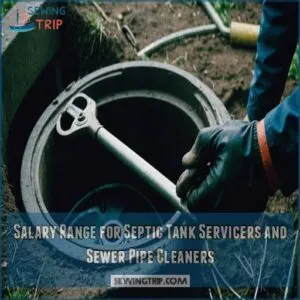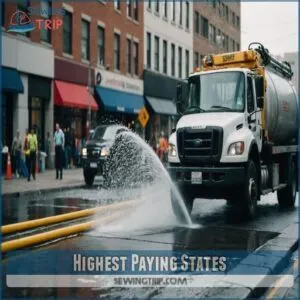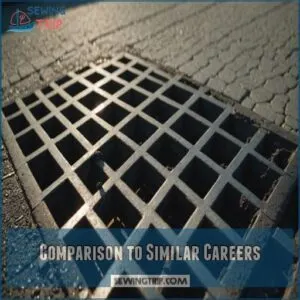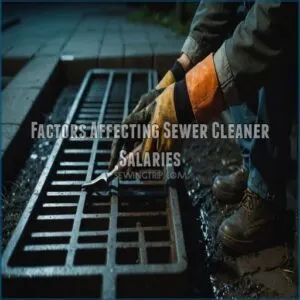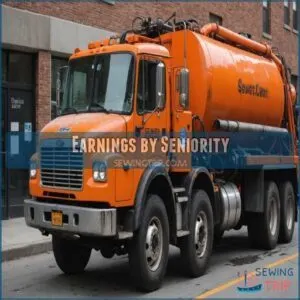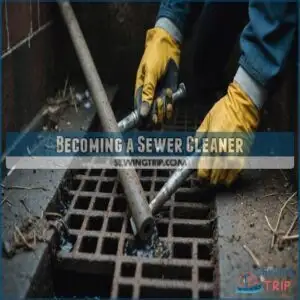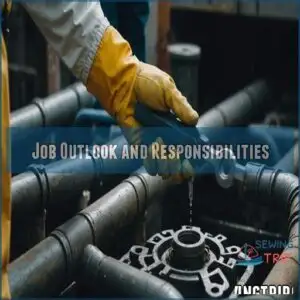This site is supported by our readers. We may earn a commission, at no cost to you, if you purchase through links.
 If you’re wondering how much sewer cleaners make, the average salary in the U.S. is $76,010 per year, or about $37 an hour.
If you’re wondering how much sewer cleaners make, the average salary in the U.S. is $76,010 per year, or about $37 an hour.
It’s a paycheck that might surprise you, given the tough nature of the job.
Think about it—these folks dive deep (metaphorically, of course) into the not-so-glamorous world of waste management.
They make sure our cities keep running smoothly, just like how regular sewing machine maintenance, such as [following a sewing machine servicing guide, can help keep your machine running smoothly, and they get well for it.
If you’re curious about how this stacks up against other jobs, or which states pay the most, stay tuned for some eye-opening facts that might just blow the lid off your assumptions!
Table Of Contents
Key Takeaways
- You’ll find that sewer cleaners in the U.S. earn a decent salary, averaging around $76,010 per year, making it a surprisingly lucrative job given the tough nature of the work.
- Starting salaries hover around $30,000 annually, but with experience and seniority, earnings can grow significantly, especially in high-demand areas.
- Some of the top-paying states include Alaska, Illinois, and New York, where salaries can reach well over $60,000, reflecting factors like job demand and living costs.
- Sewer cleaners often receive benefits like health insurance and retirement plans, and there’s potential for overtime pay, adding value beyond the base salary.
Sewer Cleaner Salary Ranges
You might be surprised by how much sewer cleaners can earn.
Let’s look at the salary ranges for these essential workers, including the highest-paying states and how pay varies across the country.
Salary Range for Septic Tank Servicers and Sewer Pipe Cleaners
Ever wondered what sewer cleaners rake in? You might be surprised.
In 2024, septic tank servicers and sewer pipe cleaners are pulling in some decent dough.
On average, you’re looking at $40,000 to $60,000 annually.
But don’t let that number fool you – your paycheck can vary wildly depending on experience, location, and whether you’re willing to get your hands dirty with overtime.
Highest Paying States
To maximize your earnings as a sewer cleaner, consider these top-paying states.
You can also find more information on products and resources related to the highest paying states.
- Alaska: $65,210
- Illinois: $62,730
- New York: $61,950
- Washington: $61,420
These figures reflect the impact of factors like cost of living, job demand, and union presence.
Keep in mind that while these states offer higher salaries, they often come with increased living expenses. It’s all about balancing the paycheck with your lifestyle needs.
Salary Ranges in Other States
While top-paying states offer impressive salaries, other regions shouldn’t be overlooked.
Let’s peek at some salary ranges across the U.S.:
| State | Salary Range |
|---|---|
| Texas | $35,000-$55,000 |
| Florida | $32,000-$52,000 |
| Ohio | $34,000-$54,000 |
| Georgia | $33,000-$53,000 |
| Arizona | $36,000-$56,000 |
These figures can vary based on factors like cost of living, state regulations, and local job demand.
Keep in mind that industry trends may influence these ranges over time.
How Sewer Salaries Compare
You’re about to see how sewer cleaner salaries stack up against similar jobs.
We’ll also look at what factors can make your paycheck as a sewer cleaner go up or down.
Comparison to Similar Careers
Wondering how sewer cleaner salaries stack up?
To find more information on sewer cleaner salaries, you can check out products related to sewer cleaner salary products.
Let’s compare them to similar jobs.
Plumbers typically earn more, with a median salary of $59,880.
Drain cleaners and sanitation workers often make less, around $40,000 to $45,000.
Construction workers’ pay varies widely but averages $37,890.
Waste management workers earn about $45,010.
Remember, these figures can fluctuate based on location, experience, and specific job duties.
Factors Affecting Sewer Cleaner Salaries
Location, experience, and certifications shape sewer cleaner salaries.
Imagine this: earning varies by state due to cost of living and demand.
Experience boosts your paycheck as skills refine over time.
Certifications? They can edge you ahead, especially with specific equipment or safety protocols.
So, leveling up often means better pay, no magic wand needed—just strategy and persistence!
Earnings by Seniority
As a sewer cleaner, your earnings can substantially increase with experience and seniority in the field.
While starting salaries might seem modest, they can grow impressively, reaching attractive figures as you gain more skills and expertise.
Starting Salary for Sewer Cleaners
Stepping into sewer cleaning, you’ll find the starting salary around $30,000 annually.
With an average entry-level pay reflecting the modest beginnings typical in skilled trades, this career doesn’t demand a fancy degree, much like Sewing for Income, which requires basic skills like hemming and mending to generate income.
Learn to Sew for Income shows that even unglamorous jobs can have potential for growth.
What you do need are steady hands and a gritty attitude.
It’s not glamorous, but there’s room to grow as you gain experience.
Salary Growth With Experience
After landing your first sewer cleaning gig, you’ll likely see your pay increase steadily.
Experience-based pay is common; expect raises as you gain skills and seniority.
Think of it as a reward for mastering the art of unclogging!
Consistent pay increases are typical, boosting your salary year after year.
This salary progression is a key part of career advancement in this field.
Your experience is your biggest asset.
Maximum Salary Potential
As you advance in your sewer cleaning career, the maximum salary potential might surprise you.
Earnings climb with your experience, certifications, and education.
You can also find specialized equipment and tools for sewer cleaning jobs at online stores like Sewer Cleaning Jobs.
Here’s what you can expect:
- Experience: More years often mean more dollars.
- Location: Some states pay more than others.
- Company Size: Larger companies might offer better pay.
Even the underground world can be lucrative!
Becoming a Sewer Cleaner
If you’re considering a career as a sewer cleaner, you’ll find it’s more about dedication than anything else.
Most positions don’t require a college degree, but having some experience in manual labor or maintenance can boost your chances.
Education and Degree Requirements
Thinking about becoming a sewer cleaner? Don’t worry, you don’t need a fancy degree.
In the sewing industry, mastering skills like sustainable fashion techniques through sewing careers can often be just as valuable, if not more so. Often, basic education and strong job skills are enough.
Certification programs and training courses help boost your credentials.
Keep in mind, required licenses vary by location.
Gaining the necessary expertise makes sure you handle the role safely and efficiently, opening doors to this essential job.
Preferred Experience
Gaining hands-on experience might feel like tackling an obstacle course, but it’s key for sewer cleaning jobs.
Previous jobs in maintenance or construction can give you an edge.
Relevant skills like pipe repair or safety certifications boost your chances.
Training programs often teach you the ropes, while industry certifications show you’re serious.
Get started and watch your career flow.
Industries Employing Sewer Cleaners
When you’re diving into sewer cleaning, a variety of industries offer opportunities.
Before starting the job, it’s important to know how to find sewer lines, which helps you navigate the underground infrastructure.
You’ll find positions in:
- Construction companies handling underground infrastructure
- Municipalities maintaining public sewer systems
- Private companies specialized in sanitation services
- Industrial facilities and wastewater treatment plants managing waste
These sectors need skilled cleaners to keep things flowing smoothly.
Job Outlook and Responsibilities
As a sewer cleaner, you’ll be glad to know the job outlook is steady, with demand for maintaining essential sewer services likely to grow.
You’ll also find that responsibilities cover everything from cleaning to repairing sewer systems, keeping you busy and vital to urban infrastructure.
Job Outlook and Growth Prospects
Because sewer systems are essential, the job outlook for sewer cleaners is generally positive.
Industry trends show a steady demand, and employment projections suggest continued growth.
The labor market needs skilled workers, making this a stable career path.
Future demand is likely to increase as aging infrastructure requires more maintenance.
So, if you’re considering this field, you’re looking at a promising future.
Responsibilities of Sewer Cleaners
You’ve got a pretty gritty job, but someone’s got to keep everything flowing smoothly, right?
Your main gigs include ensuring safety precautions while handling equipment, managing waste disposal, and pulling off emergency repairs with finesse.
Customer service is key; nobody likes a smelly surprise!
Your role blends hands-on work with the art of keeping things tidy down below.
Cleaning and Repairing Sewer Systems
After grasping their responsibilities, you move on to the nitty-gritty of cleaning and repairing sewer systems.
You’ll tackle common problems like blockages or leaks with specialized equipment.
Training’s key—without it, understanding the murky depths of sewer system safety is dicey.
Keeping up with industry trends helps too, ensuring you’re not left high and dry in this evolving field.
Frequently Asked Questions (FAQs)
Do sewers make good money?
Sewer cleaners can earn a decent living, especially with experience or in areas with high demand.
On average, wages range from $30,000 to $50,000 annually, depending on region, experience, and specific duties involved.
It’s reliable work.
How much do NYC sewer cleaners make?
In New York City, sewer cleaners typically earn between $50,000 and $70,000 annually, depending on location, experience, and the specific company.
It’s a vital job, ensuring the city runs smoothly, though it can be quite demanding.
How does a sewer cleaner work?
Ever wonder how those pipes stay clear? You use specialized equipment like high-pressure hoses and cameras to locate and clear blockages. It’s a dirty job, but someone’s gotta do it!
What benefits do sewer cleaners receive?
When you work as a sewer cleaner, you might snag benefits like health insurance, paid time off, retirement plans, and sometimes bonuses.
It’s not just about the paycheck—those perks can really add up!
Are there risks involved in sewer cleaning?
Yes, sewer cleaning involves risks.
You’ve got tight spaces, potential exposure to hazardous gases, and the ever-present danger of flooding.
Plus, physical injuries can occur.
Proper training and safety gear are essential to minimize these dangers.
What is the work schedule like?
Sewer cleaners typically work a standard 40-hour week, but shifts can vary.
You might handle irregular hours, including nights or weekends, especially when emergencies strike.
It’s not always glamorous, but essential for keeping things flowing smoothly.
Do sewer cleaners need specific skills?
You’ll need some pretty specific skills as a sewer cleaner.
Think mechanical know-how, problem-solving smarts, and a no-quit attitude.
Your day might involve working in tight spaces and handling some seriously unglamorous messes with a smile.
Is there potential for overtime pay?
Like a burst of sunshine on a cloudy day, overtime pay can brighten a sewer cleaner’s paycheck.
There’s often potential for extra hours in this field,
snatching more dollars for your hard work and dedication.
Conclusion
So, there you have it. The average salary for sewer cleaners is surprisingly high.
You’ve learned how much do sewer cleaners make, seen the salary ranges, and explored what influences those figures.
Remember, this isn’t just a dirty job; it’s a key one, keeping our cities running smoothly.
Now you’re equipped with the knowledge to think about a career in this surprisingly lucrative field, or at least appreciate the hard work involved next time you flush the toilet!

